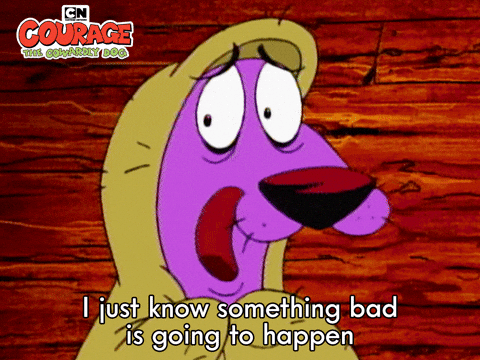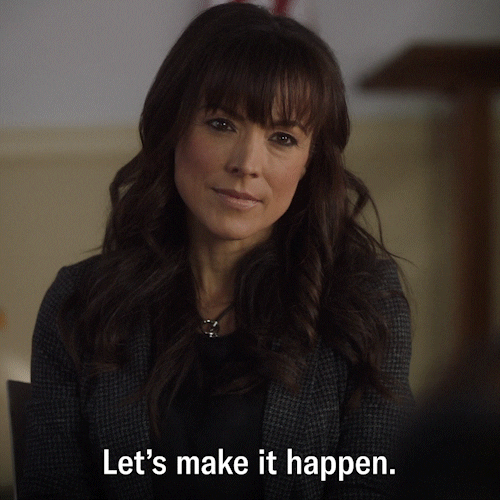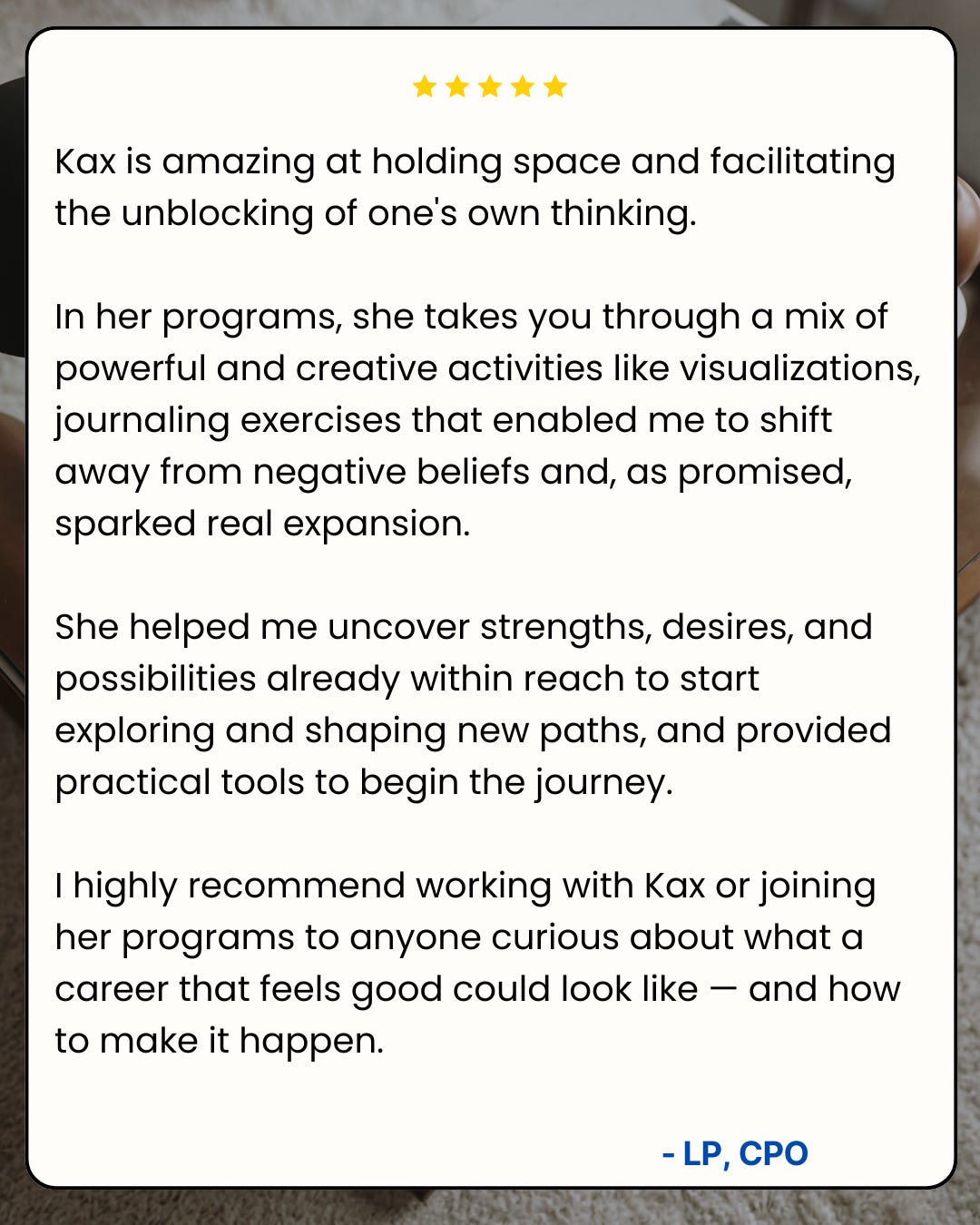#71: Courage as a Career Strategy
In case self-trust is still in progress
If I were left to my own devices, I’d be overthinking everything. Or more accurately, the quality of my thoughts will be more aligned with doom and gloom, and I’d be hiding under the table, unable to do anything, never to be seen ever again.
Ok, that’s an exaggeration, but it’s how I was “trained” for the majority of my life. Think about the worst-case scenarios and be the high-performer who gets out of it unscathed.
My relationship with uncertainty is funny. I’m not technically afraid of it. But that’s probably because I’ve already laid out 20 different scenarios of how things could play out and 100 possibilities to prevent the bad things from happening. That by the time the uncertainty has passed, I’m just exhausted.
I remember that an ex-manager had to keep reminding me that we’re Product Managers, not heart surgeons. So the worst catastrophe that I’m imagining, in real life, would probably be… not that bad actually.
But that didn’t stop me from worrying the hell out of whatever it is that I was worrying about anyway.
These days, I have a different perspective, though.
I still have the thoughts, but I no longer let them run the show and drive me to the drawing board, making Plan Bs to Zs.
Instead, I do this:
I ground myself on my why (my vision, my goals, what I want to achieve)
Remind myself that the version of myself who can make this real is already in me.
And I design the next move or decision that’s aligned with what I want, not with what I’m afraid of.
It’s not always pretty. But it’s working.
A common pattern with fears
It’s the same pattern I see with my coaching clients who work with me because they want to become better leaders, or just want to wake up on Monday with the dread. Same pattern, maybe different scripts.
They spend most of their time and energy managing their fears:
of being judged
of making the wrong move and failing
of not being deserving of the many things they want for themselves
So they manage their fears by saying yes to all the work, delaying a decision until everybody’s happy with it (even if they’re not sure they are anymore), measuring their growth against other people’s definition of success.
It can look like the responsible and productive thing to do. There’s a catch, though.
When we’re so busy managing our fears and optimizing for being seen positively by the rest of the world, we’re not really being seen — for ourselves, our strengths, our impact, and everything that we stand for.
And when we become really good at managing our fears, we neglect to build the muscles that help us overcome them.
Here’s what's scarier than other people thinking we’re weird or being bad at something that we fail:
Not spending our time and energy on things that bring us joy
Not living our lives and expressing ourselves fully
Burning out because of misalignment
And then we wonder why we feel stuck. Why we’re not in the spaces that fit our needs, our values, and our dreams.
⛑️ If you’re feeling small in your career, feeling like you’re not being recognized for your work, or not getting the results of the work that you’re doing —- it might be because you're managing your fear vs truly expressing your expertise through your work.
If you want to change you feel about your day to day and bring results, working with a coach can help you with that.
🔗 Click here to book a discovery call with me and let's see how coaching can look like for you.A confession
I’m extremely afraid of not having both feet on stable, flat ground. This makes me afraid of going down the stairs sometimes. Even more in yoga and pilates, wherein half of the time, I’m being asked to be either be upside down or standing on things that move on their own. In my head, I’m always going to end up falling, head first, and then break my neck. Morbid, I know.
At first, I had all the excuses. Anything I can come up with that can help me skip out on the movement that triggered my fear.
Then, eventually, I realized I was missing out on an opportunity to get stronger, have better balance, and the bragging rights of being able to say “I did an inverted pull-up in a Pilates chair!” 😅 (I realized after one of the trainers called me out finally lol)
So I slowly included it in my practice. A few seconds longer each time. But more than that, I’ve been helping myself feel safe while I do this new hard and scary thing. Taking it slow, pulling my feet up a little higher every single time, asking my teacher to make sure I’ve got my technique correct (or sometimes just asking them to stand next to me in case I fall lol).
A reminder that I can do hard things… even when my body, brain, and every past version of me say nope.
Which brings me to careers. Because how we relate to fear in one space often mirrors how we relate to it everywhere else.
The same way I used to avoid those movements, a lot of us avoid decisions or conversations or next steps that feel risky, even if they’re the very thing we need. And the more we avoid them, the weaker those muscles get.
So when we say we want confidence, what we often mean is: we want to feel safe doing the scary thing. But safety doesn’t come from perfecting our plans. It comes from building our capacity to act even when we don’t feel fully ready.
This is usually the turning point. When we stop focusing on how to make fear disappear, and instead start asking: what would courage look like right now?
That’s what I see over and over again with my clients: Confidence doesn’t come first. Courage does.
When courage is in the picture:
We talk to our managers about building a promotion case
We speak up in meetings to ask our question (that we might think is stupid)
We say no to the opportunity that’s not really aligned with our ambition
Ok, but just to be clear. This isn’t a shift that’s forced by sheer will power alone. It comes from building a practice that’s rooted in aspiration.
"Every week, I made new decisions not from stress or fear,
but from my own goals. And that changed everything."
– CR, Senior PM
This is how my clients and I are giving space for courage to take over our fears:
We get clear on our goals. The ideal scenario that we want to work towards. For some, it’s the kind of leader they want to be. For others, the role they aspire to have. For everybody, the kind of life they want to enable and the careers that can support it. We imagine the best-case scenarios. We allow ourselves to say out loud what we want for ourselves.
Try this: It's 12 months from now, everything has worked out for you, what does life look like? What are you doing? How are you spending your time and your energy?Then we define the version of ourselves who can make this goal a reality. The version of themselves who already lives inside of them, maybe comes out in some situations, but not always. The one who is confident, for sure. But also the one who doesn’t feel the need to respond to every fire, gives feedback with care, doesn’t take feedback personally, and speaks kindly to themselves and others.
Try this: It's 12 months from now, and everything has worked out for you. Who do you need to be to make this vision a reality? What beliefs are you carrying with you? Which ones have you let go of? What kind of decisions have you made to get there?Then we create the system that allows for that version of themselves to emerge all day, everyday, every damn day. (can’t believe there’s no TQ giphy 😮💨) We create awareness of their triggers and tendencies so they can shift from reacting to responding. We create habits and routines that raise their frequencies so they’re always attracting or creating opportunities. We experiment a lot so we can validate/invalidate the assumptions that are often linked with our fears.
Try this:If you were 5% more like the version of yourselves who is capable of making your goal a reality, how would you show up today? tomorrow?
Most of the people who start coaching with me want to get promoted to a leadership role, or turn their team’s situation around, or maybe even start a side hustle. Fair!
But to get there is a series of results that stack up. And these results come from everyday choices that we’re often afraid to take, and when we stop waiting to feel ready to take them.
A piece of feedback given to a senior leader can lead to them tapping you to share your insights in more leadership meetings, which might bring a promotion later on.
A 60-minute delay in replying to somebody’s Slack message asking if you have 5 minutes can give you more breathing room, which brings more space to think and work with your team to define a strategy
A single introduction at a conference can lead to meaningful conversations, and then an invitation to speak at a conference.
We can’t attract or create opportunities if nobody can see us because we’re too afraid to show up the way we truly want to.
With my 1:1 clients and with the participants of my 8-week Stuck to Expansive Program, we always talk about how growth is not easy.
Growth can be frickin’ hard!
But you know what else is hard? Staying in the same place, unhappy, unfulfilled.
So here’s what I always end up saying:
Choose your hard. And if you can do hard things, you can do anything.
Question for you: What hard are you choosing to this week? The one that you’ve been afraid to try but could have an impact in your goals? I'd love to know in the comments or you can reply to this email directly.
📌 Coaching Bulletin Board:
Why I coach: I believe that if there are more and more people prioritize their wellbeing, choose career moves that are in alignment with their values and ambition, and help others do the same — then we can change how this industry operates and make it more kind, human, and in service of the people (and not just the investors).
📌 If you’re going through some big hairy challenges that you can’t seem to figure out right now, I’m hosting a 90-minute free workshop on July 15, 2025! Join me!
📌 I’m building something for first-time Product, UX, and Tech leaders. If you’re struggling to empower your team, deliver the impact that matters to the business, influence people within your organization, and try to stay sane through it all, I’d love to support you. I’m looking for 10-15 people to pilot the Leadership Lab with me. You can read all about it and sign up for the waitlist here.
📌 But if you feel that a dedicated space is what you need, then 1:1 Coaching might be the space for you. For the new and emerging leaders in Product, UX, and Tech going through career dilemmas, I’d love to help you define your strategies to set yourself and your team up for success. Book a free call and let’s discuss how we can work together.
If you got to this part of this newsletter, thanks for staying with me until the end. And thank you for sharing with me topics that you’d like for me to share my thoughts, feelings, and violent reactions on.
❤️
Kax







